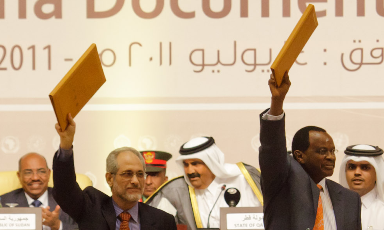Security Council demands Darfur rebels negotiate peace under Doha Document
July 30, 2013 (KHARTOUM) – The United Nations Security Council (UNSC) has called on rebel groups in Sudan’s western region to end the violence and hold peace talks with the national government under the basis of the Doha Document for Peace in Darfur (DDPD).

The UNSC has seemingly preferred to back the decision of the AU earlier this month which called on the international community to support the DDPD and to disregard calls by rebel groups for a comprehensive process leading to regime change.
In a communique issued on 19 July, the UNSC said that a holistic approach to bringing democratic transition in Sudan can be achieved once the ongoing conflicts in Darfur and the Two Areas are settled in an inclusive manner with the support of an AU panel chaired by former South African president Thabo Mbeki.
A resolution unanimously adopted on Tuesday called on all parties to the Darfur conflict “including in particular all the non-signatory armed groups, engage immediately and without preconditions to make every effort to reach a permanent ceasefire and a comprehensive peace settlement on the basis of the Doha Document for Peace in Darfur”.
The resolution, which was drafted by Rwanda, Togo and the United Kingdom, urged for the cessation of all acts of violence in Darfur and welcomed the efforts of UNAMID chief and joint mediator Mohamed Ibn Chambas, who made contact with the rebel groups last May in order to revitalise the peace process.
Chambas is also expected to meet rebel leaders next August to pursue consultations on ways to achieve peace in Darfur.
The Sudanese government and Tijani El Sissi’s Liberation and Justice Movement (LJM) signed the DDPD on 14 July 2011 after two years of failed talks with rebel groups in the region, including the Justice and Equality Movement (JEM) which rejected the peace framework. However, a JEM splinter faction later joined the process and signed an agreement with Khartoum in April of this year.
JEM has rejected the AUSC’s recent decision to support the DDPD and called on the body to reconsider its position, adding that its current stance raises doubts about its neutrality and seriousness in the search for a real solution to the conflict in Sudan.
JEM, the two main factions of the LJM and the Sudan People’s Liberation Movement-North (SPLM-N) – which is fighting the Sudanese government in Blue Nile and South Kordofan states – have called for a comprehensive process that involves opposition parties aiming to institute a new regional administration with larger autonomy and the re-establishment of a democratic and secular system throughout Sudan.
The rebels say that though they have the support of different international actors – particularly the United States and Canada – there has been no official position or proposed plans for change forthcoming from these countries concerning the matter.
Addressing the UNSC meeting, the Sudanese ambassador to the UN, Daffa-Alla Elhag Ali Osman, welcomed the resolution to renew UNAMID’s mandate and hailed its support for the DDPD.
Alluding to the alleged support that rebel groups receive from South Sudan and other countries in East Africa, Osman pointed out that direct and indirect support for non-signatory armed movements must end.
Osman further demanded that his government be involved in the review process of UNAMID’s mandate.
He praised the condemnation of the “killing of Mohamed Bashar and other members of his movement by JEM-Gibril forces” and pledged that his government would cooperate with the UNSC to investigate those responsible for the death of seven Tanzanian peacekeepers in South Darfur.
(ST)
